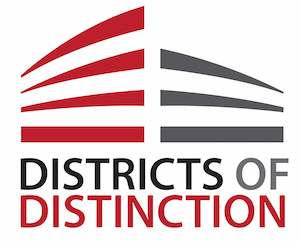 Students in the Houston-area district took on an “innovation challenge” and, calling themselves the Water Warriors, prototyped flood barriers to protect their neighborhoods and school buildings.
Students in the Houston-area district took on an “innovation challenge” and, calling themselves the Water Warriors, prototyped flood barriers to protect their neighborhoods and school buildings.
Such real-world challenges have now become a linchpin of STEM instruction in the suburban district, which has been recognized as a District of Distinction in the category Curriculum & Instruction by District Administration.
“One of the things we’re passionate about in Klein ISD is leveraging student voice in the design of learning experiences,” Superintendent Jenny McGown says. “And we heard from students that they wanted more opportunities to solve real-world problems.”
PBL + Hurricane Harvey equals ‘electrifying learning’
One Klein ISD school was completely flooded by Hurricane Harvey while many in the area lost their homes and students experienced the disaster firsthand.
“People had such personal investment with the problem of flooding,” McGown says. “Our students rose to the challenge and created an unbelievable solution.”
For the second innovation challenge, “Klein In Space,” students in grades 5-12 learned to design experiments for zero-gravity environments. They connected with other students and experts in the field through the Student Spaceflight Experiments Program, a national STEM initiative.
This school year, the “Operation Lifeline” project is challenging K-12 students to design medical packs to deliver refrigerated medicine to disaster areas.
A highlight of each year’s challenge is the annual Day of Design, which McGown calls “an absolutely electrifying learning experience.”
Students from across the district share their prototypes with each other and with industry experts. Students also get to work with teachers from other schools while professionals provide feedback and guidance.
More from DA: How grand-prize winner closes achievement gaps with music immersion
“The number of industry partners who have provided expertise throughout the challenge has been amazing,” McGown says. “It’s a day where we’re truly breaking open the walls of every single classroom of every single school.”
Asking for help in Klein ISD
Professionals also mentor students as they work on their innovation projects throughout the school year. Connections are made in person and digitally, via Skype, text messaging and other platforms. “These are skills students need when they graduate—to pick up the phone and say, ‘I’m working on a problem and I hear you’re an expert, so can you help me with it.’”
These relationships have created tighter links to the community. “So often, we tell people outside the world of education about the great things happening in our schools but they sometimes have difficulty connecting to the story of the district in a meaningful way,” she says.
More from DA: How a District of Distinction takes ed tech to new heights
The innovation challenges have also spawned a high school initiative called KleinHacks, a 24-hour invention marathon during which students code new websites and apps.
Students have focused on real-world concerns such as how to create inclusive gaming environments and the prevalence of texting and driving.
“We’ve certainly observed increased student engagement and enthusiasm for the content,” McGown says. “That’s mainly because the challenges are actual problems to solve in the world and students get to do it by collaborating with peers and experts.”
Fortifying a future workforce
About 1,000 students participate in innovations challenge annually. And since the initiative launched, fifth- and eighth-graders have improved their scores on state math and science tests.
Klein ISD
Klein, Texas
Students: Approximately 54,000
Superintendent: Jenny McGown
Innovation challenges launched: 2017-18
These results gibe with Klein ISD’s “Profile of a Learner” vision statement, which district educators created to foster a classroom culture of risk-taking, innovation and self-reflection, McGown says.
The profile also says that graduates, to lead successful lives, must remain lifelong learners who are comfortable embracing challenges and failing forward. That’s why concepts such as design thinking and service learning now play a transformative role in both the innovation challenges and everyday instruction, McGown says.
More from DA: View the 2019 District of Distinction honorees
“Students can’t just memorize content,” McGown says. “They have to identify a problem, test, iterate and refine—put their solutions through the whole cycle.”
This mindset will be essential in the workplaces of the future, she adds.
“As the world moves more towards machine learning and robots being able to do a lot more things, skills like problem-solving, collaboration and emotional intelligence will be absolutely critical to the future workforce.”
Matt Zalaznick is DA’s senior writer.







